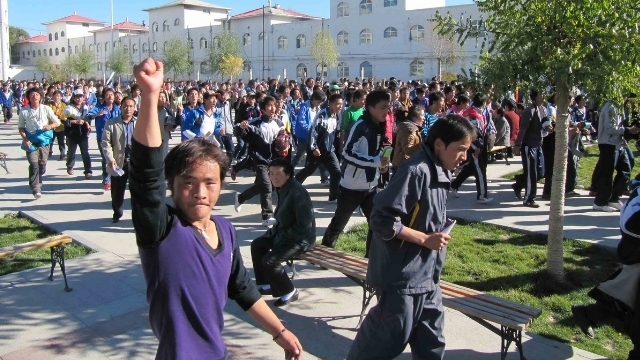The CCP’s policy of eradicating cultural, religious, and linguistic identities is systematic, and derives from Xi Jinping’s reflections on the fall of the Soviet Union.
by Massimo Introvigne

Bitter Winter has documented in the last few weeks the escalation of the cultural genocide in Xinjiang, Tibet, and Inner Mongolia. In all three so-called “autonomous regions,” the language, culture, and religion of people other than the Han Chinese are being annihilated. Since mass detention, extra-judicial killings, and systematic rape of women are also involved, some of our readers wrote to Bitter Winter that this is now more than “cultural” genocide and is, in fact, genocide in its classic form.
Quite apart from the legal questions about the definition of genocide, what is certain is that things are going from bad to worse under Xi Jinping. Why is this happening?
Chairman Mao launched a policy of designating “recognized nationalities” (minzu, 民族), to which some limited rights were recognized with respect to the use of their language and the preservation of (selected parts of) their culture. Eventually, 55 minzu were recognized. Scholars such as Gerald Roche and James Leibold claim that this was already a “paper genocide,” because within the borders of China there are hundreds of distinctive groups with their own culture and language, not 55 only. The existence of other groups beyond the 55 minzu was simply ignored, or they were merged into one of the 55 recognized nationalities. For example, the Baima and Ersu people of Sichuan have been “merged” into the Tibetan minzu and regarded as Tibetans, which they claim they are not.
In 2014, Xi Jinping put an end to any hope by non-recognized minorities to find a place among the list of minzu, by announcing that not only no new minzu will be recognized but the number of the existing minzu will be eventually reduced by “merging” some of them.
If “paper genocide,” defined as denial of their very existence, is the destiny for the unrecognized minorities, those who have been recognized as part of the 55 minzu face a different threat, which is cultural genocide—and possibly, physical genocide too.
The official name under which cultural genocide is hidden in CCP language is “second-generation ethnic policies” (第二代民族政策). This means that the measures allowing a limited protection to minzu languages and cultures were acceptable for the first generations, who needed time to adapt to the CCP-dominated system. But they should disappear for the second generations. For example, it was reasonable to grant exceptions to some minzu from the rules limiting the number of children, because they needed time to understand and adapt to the CCP system. But it is not reasonable to maintain these exceptions today, nor to help minzu children with extra points in the university entrance exams. Eventually, minzu should be fully “sinicized,” and should learn to use Chinese as their main language, reducing their traditional languages to cultural and folkloric remnants to be kept and studied as a sort of dead languages.
Xi Jinping and the CCP leaders of his generation are obsessed by the fall of the Soviet Union and other Communist countries in Eastern Europe. For them, understanding what went wrong there is literally a question of life and death, as their problem is avoiding that the CCP shares the same fate of the Communist parties in Eastern Europe. Xi Jinping believes that reasons for the fall of Communism in Russia and its neighboring countries include the criticism of Stalin and the free rein left to independent religion. For this reason, Xi continues to crack down on religion and refer to Stalin in his speeches and writings.
There is, however, one point where Xi believes that Soviet Russia had actually a bad influence on China. The republics forming the Soviet Union were never totally autonomous, or as much autonomous as the Soviet Constitution proclaimed. Yet, some CCP ideologues believe that their autonomy, limited as it was, was too much, and that the Soviet example was wrongly followed by Communist China when it granted too many rights to the minzu. This is compatible with Xi’s admiration for Stalin, as Soviet “federalism” may be presented as a mistake made by Lenin, or those around him, and originally opposed by Stalin—a view, by the way, supported by Vladimir Putin in terms strikingly similar to those used by the CCP ideologues.
In China, this position was advocated by Hu Angang and Hu Lianhe from Tsinghua University’s Center for China Studies, in 2011. They connected the “federalist” system with the fall of the Soviet Union, and created the formula “second-generation ethnic policies.” While Hu Angang was already an extremely influential CCP intellectual well before Xi Jinping became the Party’s General Secretary, it has been Xi who has adopted the new ethnic policies wholeheartedly.
On September 14, 2020, You Quan, a member of the Secretariat of the CCP Central Committee and head of the United Front Work Department of the CCP Central Committee, spoke at a conference on “ethnic solidarity” in Chengdu, Sichuan, calling for “more efforts to extend the use of Mandarin and Chinese characters.”
The same conference was attended by Bater, an Inner Mongolian who is You Quan’s deputy in the United Front Work Department and an ethnic Mongolian himself. Bater is also the head of the CCP’s National Ethnic Affairs Commission.
Bater wrote an in-depth theoretical apology for the campaign compelling minzu to adopt Chinese as their main language, by quoting Karl Marx to the effect that whoever controls the language controls the community, and reminding his readers that the Roman Empire, England, and France historically established their hegemony by imposing their language.
Source: Bitter Winter












